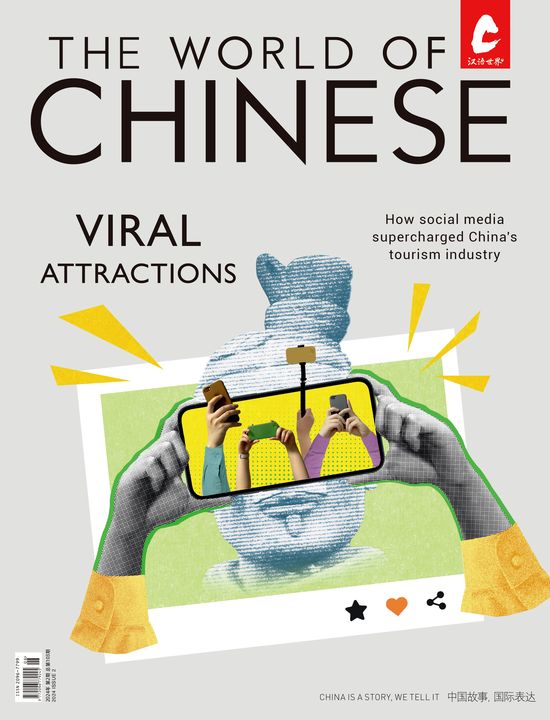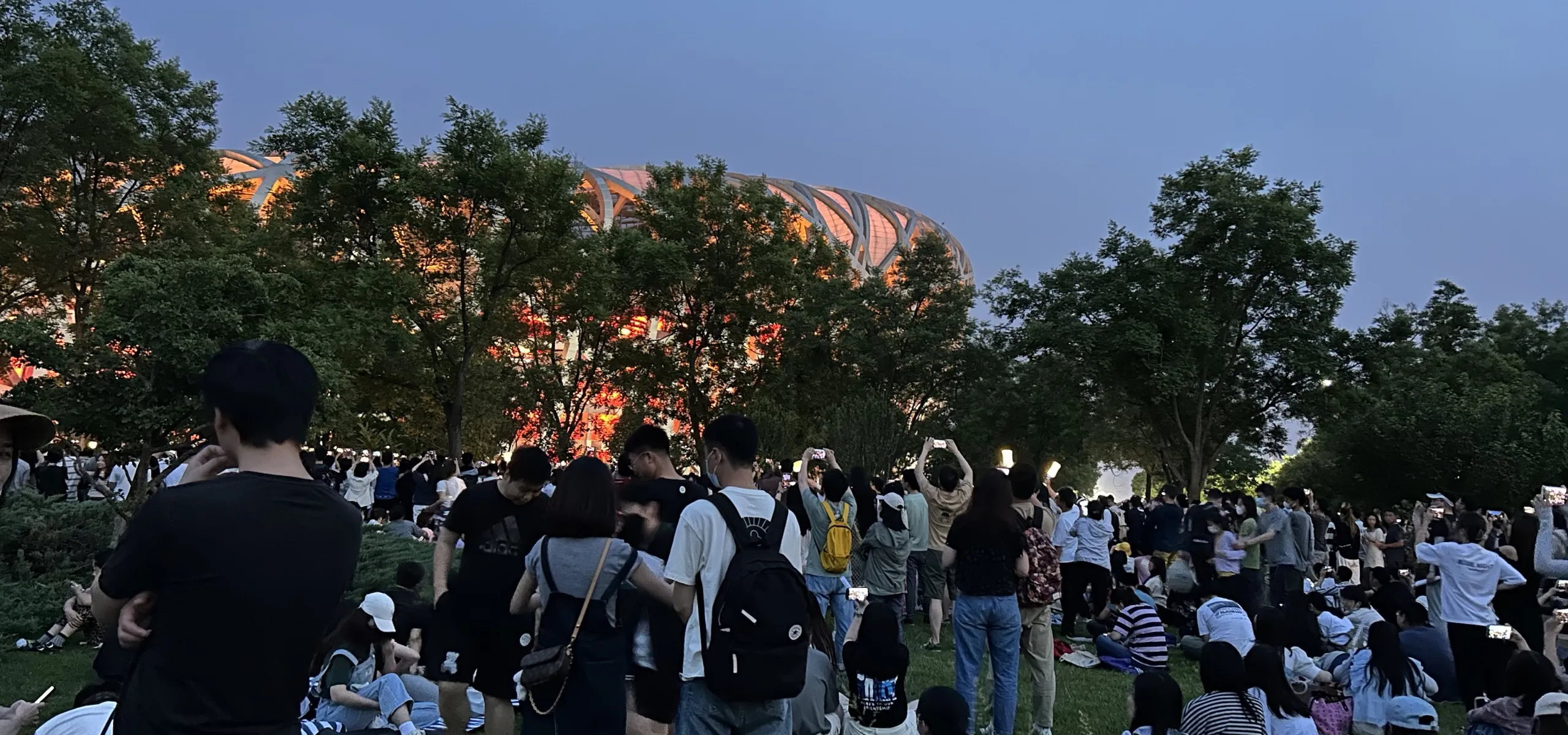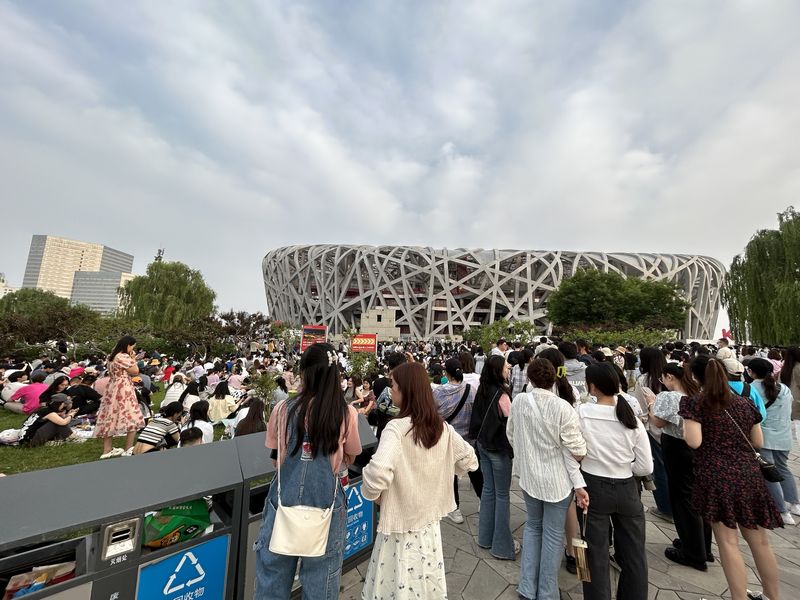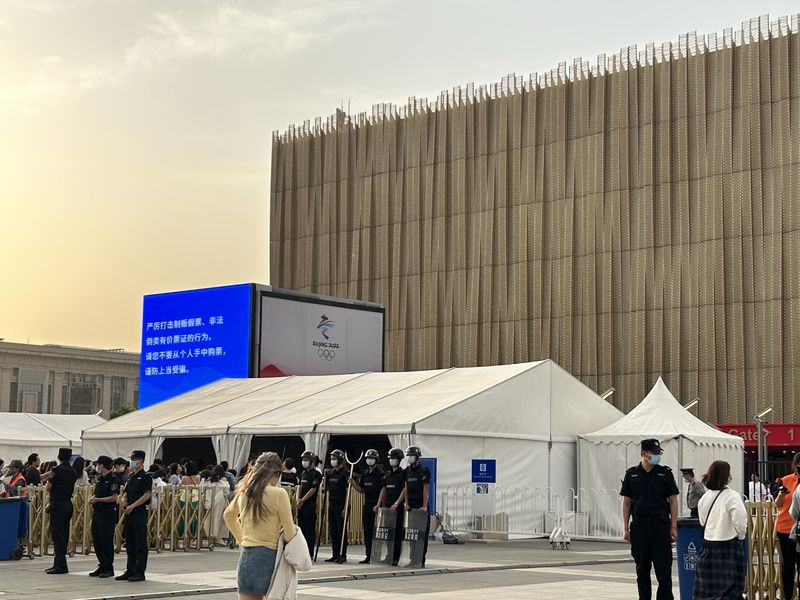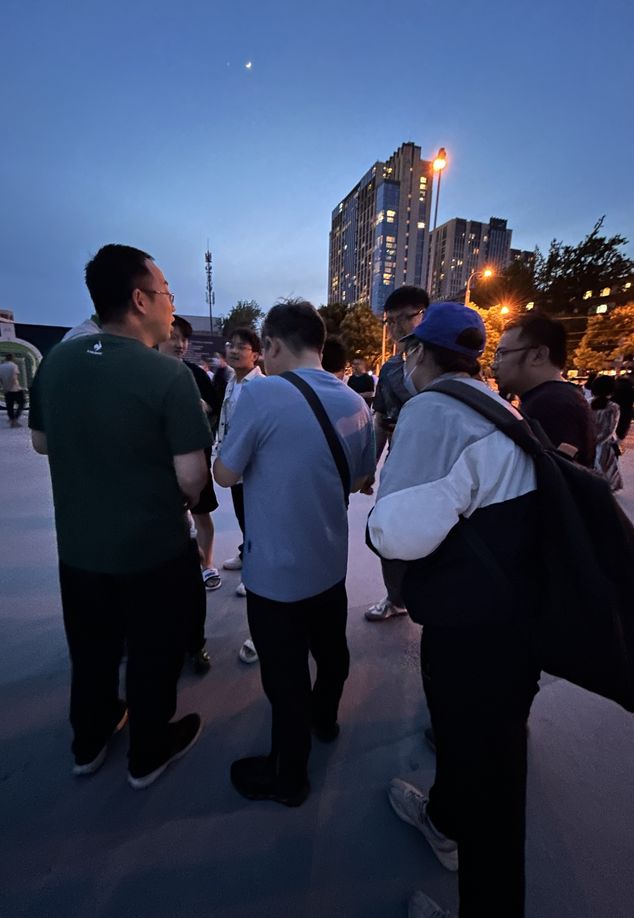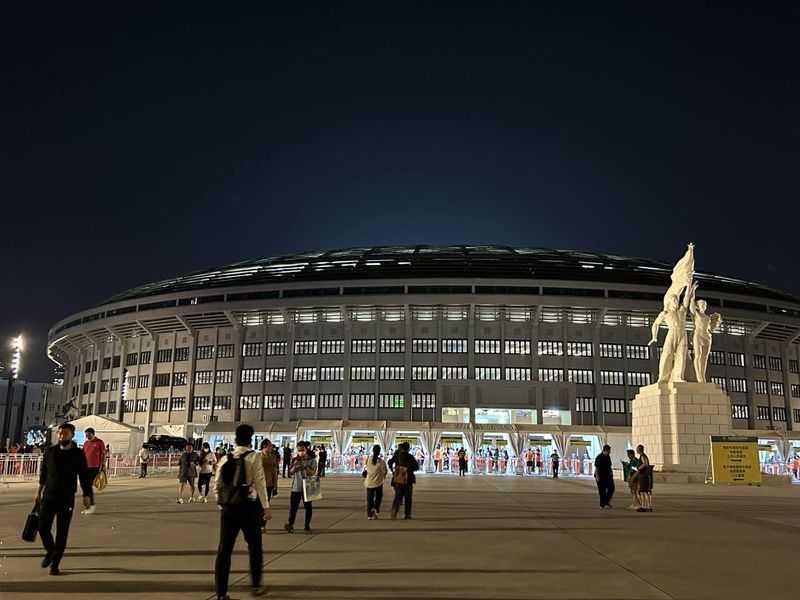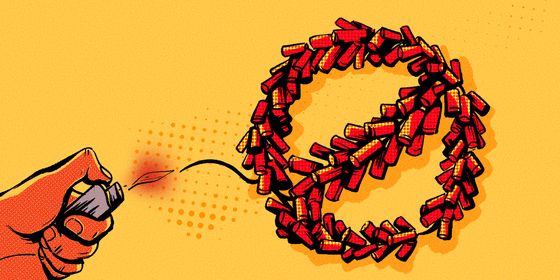Despite fan boycotts and government crackdowns, China’s ticket scalpers continue to turn profits with high prices
At 6:30 p.m. on May 26, as Taiwan rock band Mayday tuned up to play a sold-out concert, there seemed to be a bigger crowd outside Beijing’s National (“Bird’s Nest”) Stadium than on the inside. But among the disappointed fans who weren’t able to get tickets, there were others congregating there for a different purpose—to protest the practice of buying and reselling tickets at high prices, or scalping.
In fact, unlike the usual case with major ticketed events in China, scalpers, or huangniu (黄牛, literally “yellow oxen”), were conspicuously missing outside the stadium that day. Under the slogan “We’d rather stand outside Bird’s Nest than let the huangniu profit,” which trended on Weibo in the month since Mayday’s concert tickets went on sale in early May, fans agreed to show up with their own camping chairs, posters, and glowsticks, and sing along to the band on the lawns and squares outside the stadium, instead of buying expensive scalped tickets.
Xiao Ru, a decade-long fan of Mayday and one of the protestors outside the stadium, was pleased to see the size of the crowd. “It worked!” she tells TWOC as she surveys the people gathered. Still, Xiao, who asked to be identified by a pseudonym, admits the goal of ending the illegal practice of ticket scalping—or “wait until huangniu have a breakdown and return tickets to normal price,” as she puts it to TWOC—may not be achievable in the near future, as ID-based ticketing rules are loosely implemented and still leave many loopholes like “complimentary tickets” that end up on the black market.
It’s not known how the term huangniu originated in Chinese. One popular theory links it with the emergence of trains and buses in Shanghai in the 1920s and 1930s. Rickshaw pullers on the Bund, who had connections at the train and bus stations, started taking a surcharge for helping people buy tickets. One of the words for rickshaw was huangniuche (黄牛车) due to the hard work of the pullers, who were compared to oxen, so huangniudang (黄牛党, “cattle gang”) became the word to refer to all scalpers.
In previous decades, scalping was considered a helpful and reliable service for not just transportation tickets, but other scarce goods like movie tickets, or even food and other necessities during the planned economy era. “The huangniu in Shanghai are organized and responsible. Though the movie tickets they sell are a little expensive, they’re definitely genuine and ensure people access to the film,” a Shanghai saying during the 1920s to ’40s supposedly goes, according to Professor Meng Zhaochen of Jilin University in his Illustrated Book of Old Shanghai Sayings.
Nowadays, however, scalping is seen as a cutthroat, for-profit business, especially as it has moved online. Huangniu exist not just for performance tickets but also train tickets, hospital registration, and other sought-after goods and services. Using a combination of software or personal connections with the vendors, scalpers are accused of buying up huge swaths of tickets as soon as they go on sale, which they can then resell with a huge mark-up.
“They grab lots of tickets, depriving many true fans the opportunity to get into the venue, and then charge them higher prices [for the opportunity],” complains 32-year-old Wu Di, who has been fan of singer Li Yuchun since 2005, when Li won first place in the Super Girls singing talent show with over 3.8 million votes from viewers nationwide.
“[Our] money does not grow on trees,” Wu says, explaining that the extra money fans pay for huangniu tickets is “meaningless” since it cannot contribute to Li’s earnings. Instead, “it may harm her reputation for being supposedly associated with the high price,” another fan of Li from Zhengzhou, Henan province, told TWOC outside Beijing’s Wukesong Arena, half an hour before Li’s concert was due to start on May 20.
To support their idol, many of Li’s fans have retaliated by pledging to stop using huangniu services. When selling their unused tickets or exchanging them with one another, they vow to trade at original prices. Buyer and seller will show each other the Li Yuchun albums they own in order to prove that they are genuine fans. Some have even formed so-called “cattle-slaughtering teams” to identify huangniu and warn people about them online (though TWOC did not encounter any huangniu butchers outside the stadium that day, and was instead approached by half a dozen huangniu asking, “Want tickets?”).
The issue has become more prominent this year due to the trend of “revenge spending” with the revival of the offline performance industry after the pandemic. Damai, China’s largest online ticketing system for concerts, stage plays, and sports matches, sold tickets for 47,000 performances this February and March, triple that in the same period of 2019. The box office earnings from ticket sales increased by 127 percent on the platform. Many concerts and musical festivals sold out quickly: For instance, on May 9, around 300,000 tickets for Mayday’s six concerts in Beijing between May 26 and June 3 reportedly sold out in five seconds after release on Damai and two other booking platforms.
“This year, eight friends helped book tickets for me on their cellphones, but only one succeeded in buying one,” says Xiao Ru, who tells TWOC that in previous years, she could buy tickets for herself and even had time to consider different prices.
When people who failed to snap up a ticket swarmed online to share their astonishment, disappointment, and wish for extra tickets, they found abundant tickets being sold on e-commerce platforms and social media for many times their original prices (which ranged from 355 yuan to 1,855 yuan), with “VIP seats” being hawked by huangniu at 18,800 yuan.
Many people have no choice but to resort to huangniu since they often control a large portion of the tickets. An industry insider, speaking to news portal NetEast Finance this April, estimated that huangniu control at least half of all the performance tickets via connections with the event organizers and ticket booking platforms.
Though Beijing Huayue Feifan Culture, the organizer of Mayday’s events on the Chinese mainland, denied working with huangniu and pledged to boycott scalpers together with fans, they made no comment about complimentary tickets. According to regulations from China’s Ministry of Culture, these types of tickets can be reserved for the performer’s staff and sponsors, and can make up a maximum of 30 percent of all tickets available for the event. They are given out without needing any payment or ID information from the ticket-holder, leaving much room for scalping.
Technology has made things more complicated. Though online ticketing platforms now require buyers to enter their ID number to purchase tickets, and set limits on how many tickets can be purchased with one ID, huangniu can still bypass the restrictions using software or hiring individuals simply to help snap up tickets online with their ID cards. This February, Chinese band Escape Plan and the ticket booking platform ShowStart identified 92 tickets for their 2023 concert tour bought with one single phone number.
Complimentary tickets aside, some venues have ID checks and even facial recognition at the door, though this has raised concerns over privacy and also makes it difficult for genuine buyers to offload tickets they no longer want to use. In May, after organizers of concerts by singers Rene Liu and Fish Leong announced they would enforce ID checks and facial recognition at the gate, and allowed buyers who didn’t accept these rules to get a refund, a large number of tickets, supposedly bought up by scalpers, became available again.
However, Xiao Ru is not optimistic about the effectiveness of these policies. “The authorities won’t spend as much energy on [reinforcing rules] on performance tickets as that on train tickets, since they’re not essential goods,” she points out.
Meanwhile, despite the ongoing crackdown, the business of scalpers online seems to continue as usual. At around 3:30 p.m. on June 3, three hours before Mayday’s last concert in Beijing, TWOC (posing as a customer) contacted a store on e-commerce platform Taobao, which has run for six years and sold over 100 tickets of the band’s concerts according to the shop’s profile. The seller offered TWOC a “bargain price” of 3,800 yuan each for the last two 855-yuan tickets they had—claiming a discount from 4,500 yuan that morning. The customer service staff also promised that they can snap up tickets for TWOC for the band’s upcoming concerts in Hangzhou, boasting a “success rate of 90 percent.” It will take more than facial recognition to halt these determined yellow oxen.
Additional reporting by Yang Tingting (杨婷婷)
